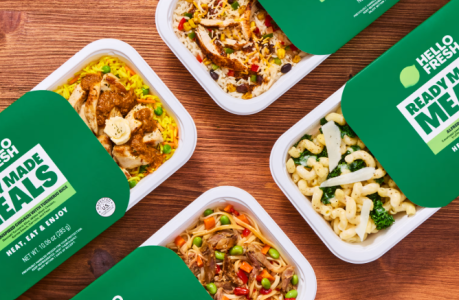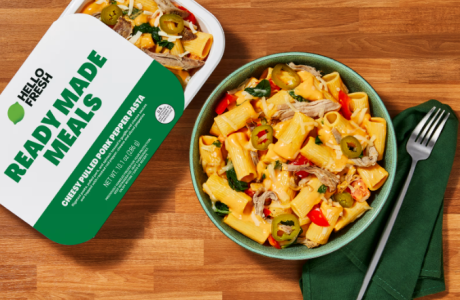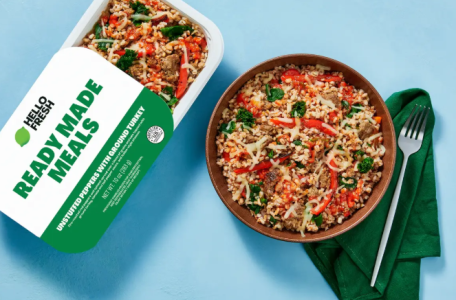Is your dinner at risk? Ready-made meals recalled over spinach listeria contamination
- Replies 0
If you’re a fan of convenient, ready-to-heat dinners, you may want to check what’s sitting in your fridge.
A major food manufacturer has announced a recall involving meals shipped across the US, after one ingredient was flagged for possible listeria contamination.
The discovery has prompted federal food inspectors to issue an urgent warning, as customers of a well-known meal brand are now being asked to throw out specific ready-made dishes.
For many who rely on home-delivered meals, this latest scare is a sharp reminder that even trusted names aren’t immune to contamination risks.
The US Department of Agriculture’s Food Safety Inspection Service (FSIS) issued an urgent advisory on October 6th, warning consumers not to eat specific HelloFresh ready-made meals.
The issue traces back to spinach that tested positive for Listeria monocytogenes, a bacterium notorious for causing listeriosis—a potentially serious foodborne illness.
The spinach in question was supplied by FreshRealm, the manufacturer behind HelloFresh’s Ready Made Meals (not to be confused with their meal kits, which you cook yourself).
FreshRealm discovered the contamination during routine testing and immediately notified the authorities.
As of now, there have been no reported illnesses linked to these meals. But as you all know, when it comes to food safety, it’s always better to be safe than sorry.
Source: themonticarlo / Instagram
The FSIS recommends tossing them in the trash or returning them to the place of purchase for a refund.
Even if you’re tempted to “just heat it up really well,” don’t take the risk—listeria can survive in cold environments and sometimes even in cooked foods.
Next, take a few minutes to clean and sanitize any surfaces, containers, or utensils that may have come into contact with the recalled products. And, as always, wash your hands thoroughly after handling any potentially contaminated food.
HelloFresh has stated that they’ve directly contacted customers who may have received these meals, urging them to discard the products immediately.
If you have questions or concerns, you can reach FreshRealm’s customer service at 1-888-244-1562 or [email protected].
Also read: PepsiCo’s latest recall raises concerns for health-conscious consumers
Unlike many other foodborne pathogens, listeria can thrive in cold environments—yes, even your refrigerator.
Symptoms of listeria infection can appear anywhere from a few days to two months after eating contaminated food. According to the Centers for Disease Control and Prevention (CDC), symptoms include:
If you’re in a higher-risk group and experience flu-like symptoms after eating a recalled product, don’t wait—contact your healthcare provider right away.
Also read: A hidden risk in your fridge: What seniors need to know about this recall
Read next:

Have you ever experienced a food recall? How do you keep track of food safety news? Do you have tips for staying safe in the kitchen, or questions about meal kit services?
A major food manufacturer has announced a recall involving meals shipped across the US, after one ingredient was flagged for possible listeria contamination.
The discovery has prompted federal food inspectors to issue an urgent warning, as customers of a well-known meal brand are now being asked to throw out specific ready-made dishes.
For many who rely on home-delivered meals, this latest scare is a sharp reminder that even trusted names aren’t immune to contamination risks.
The US Department of Agriculture’s Food Safety Inspection Service (FSIS) issued an urgent advisory on October 6th, warning consumers not to eat specific HelloFresh ready-made meals.
The issue traces back to spinach that tested positive for Listeria monocytogenes, a bacterium notorious for causing listeriosis—a potentially serious foodborne illness.
The spinach in question was supplied by FreshRealm, the manufacturer behind HelloFresh’s Ready Made Meals (not to be confused with their meal kits, which you cook yourself).
FreshRealm discovered the contamination during routine testing and immediately notified the authorities.
As of now, there have been no reported illnesses linked to these meals. But as you all know, when it comes to food safety, it’s always better to be safe than sorry.
Which HelloFresh Meals Are Affected?
If you’ve received HelloFresh ready-made meals between September 6 and October 9, 2025, here’s what you need to look out for:Cheesy Pulled Pork Pepper Pasta
- 10.1-oz containers
- Establishment number Est. 47718 and lot code 49107
- OR establishment number Est. 2937 and lot code 48840
Unstuffed Peppers with Ground Turkey
- 10-oz containers
- Establishment number P-47718 and lot codes 50069, 50073, or 50698
Source: themonticarlo / Instagram
What Should You Do If You Have These Meals?
First and foremost: Do not eat the affected meals.The FSIS recommends tossing them in the trash or returning them to the place of purchase for a refund.
Even if you’re tempted to “just heat it up really well,” don’t take the risk—listeria can survive in cold environments and sometimes even in cooked foods.
Next, take a few minutes to clean and sanitize any surfaces, containers, or utensils that may have come into contact with the recalled products. And, as always, wash your hands thoroughly after handling any potentially contaminated food.
HelloFresh has stated that they’ve directly contacted customers who may have received these meals, urging them to discard the products immediately.
If you have questions or concerns, you can reach FreshRealm’s customer service at 1-888-244-1562 or [email protected].
Also read: PepsiCo’s latest recall raises concerns for health-conscious consumers
What Is Listeria, and Why Is It So Dangerous?
Listeria monocytogenes is a bacterium that can cause listeriosis, a serious infection especially risky for older adults, people with weakened immune systems, and pregnant women.Unlike many other foodborne pathogens, listeria can thrive in cold environments—yes, even your refrigerator.
Symptoms of listeria infection can appear anywhere from a few days to two months after eating contaminated food. According to the Centers for Disease Control and Prevention (CDC), symptoms include:
- Fever
- Muscle aches
- Headache
- Stiff neck
- Confusion
- Loss of balance
- Convulsions
- Diarrhea and other gastrointestinal issues
If you’re in a higher-risk group and experience flu-like symptoms after eating a recalled product, don’t wait—contact your healthcare provider right away.
Also read: A hidden risk in your fridge: What seniors need to know about this recall
How Can You Protect Yourself from Foodborne Illness?
While recalls like this are unsettling, there are steps you can take to minimize your risk:- Stay Informed: Sign up for food recall alerts from the USDA, FDA, or your meal kit provider.
- Check Labels and Lot Numbers: When you receive a recall notice, compare the details to what’s in your fridge or freezer.
- Practice Good Kitchen Hygiene: Wash hands, utensils, and surfaces often—especially after handling raw produce or meat.
- Store Food Properly: Keep your fridge at or below 40°F and your freezer at 0°F.
- When in Doubt, Throw It Out: It’s not worth the risk to your health.
Read next:
- Kroger issues recall on 6 frozen foods in 17 States—check your freezer now!
- Is your favorite pasta dish putting you at risk? Deadly listeria outbreak spreads across 15 states
- FDA recalls popular chocolate snack over hidden metal contamination risk
Key Takeaways
- HelloFresh has recalled certain ready-made meals containing spinach due to potential listeria contamination, though there have been no reported illnesses so far.
- The recall applies only to specific HelloFresh Ready Made Meals shipped between September 6 and October 9, 2025, with meal kits and other HelloFresh products not affected.
- Customers are advised not to eat the impacted meals, to discard them or return them for a refund, and to thoroughly clean any surfaces or containers that may have come into contact with the recalled product.
- Listeria poisoning can cause serious illness, particularly for vulnerable groups such as older adults, pregnant women, and those with weakened immune systems; anyone with symptoms after consuming affected products should seek medical attention.









